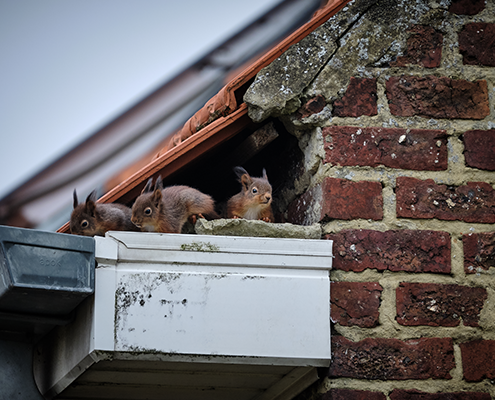PROTECT YOUR HOME FROM DAMAGE.
Wildlife may be cute out in nature, but when wild animals get inside your home they quickly become a problem. Whether it’s squirrels or bats in your attic, raccoons in your crawlspace, or any other critter taking over your home, wildlife can cause damage to your property and put your family in danger. If you want to protect your family’s health and your home’s condition, contact the local wildlife exterminators at Atlantic Pest and Termite Mgmt.!
Wildlife are drawn to your home by trash, food, or the promise of something comfortable to nest in. If these pests aren’t properly removed, they can cause extensive damage to your property and your home, including chewing through electrical wiring, damaging your siding, damaging your home’s wooden structure, and more. These nuisance pests also carry a variety of diseases that can be spread to you and your family. We protect your home from animals like:

A family of curious squirrels made its nest in a high gutter, right in a gap underneath the tiles of the roof and next to the uppermost part of the brick wall. Every day at the same time, the mother leaves the nest, while the lovely babies wait for her.
- Squirrels
- Raccoons
- Opossums
- Bats
- Rats – NOW offering ContraPest!!
- And more!
Our wildlife removal methods are second to none, and we’re eager to prove it!
Effective Animal Removal and Control Plans You Can Trust
It is important that you don’t try to handle wildlife and animal control problems on your own as wild animals are unpredictable and, if provoked, can react aggressively. When it comes to safely and effectively removing wildlife from your home, trust the team of experts at Atlantic Pest and Termite Mgmt.! Our exterminators are highly skilled at resolving nuisance wildlife problems humanely and know the tricks for keeping pests away for the long term. Here’s what to expect from our wildlife removal service:
- First, we conduct an inspection of your home, uncovering where the wildlife lives and the extent of the damage they’ve caused.
- Based on our findings, we create a customized treatment plan for your home and humanely remove the existing wildlife.
- Once we’ve removed the wildlife from your home, we’ll ensure the pests are gone for good!
- We’ll also provide repair recommendations for the damage they’ve caused to your home. In some cases, we’ll even offer to repair the damage for you, closing up areas where the wildlife was getting in.
We take the time to listen to your concerns and develop a step-by-step removal process that you’re comfortable with. Rest assured that when Atlantic Pest and Termite Mgmt. is on the job, you’re getting the best service possible!







